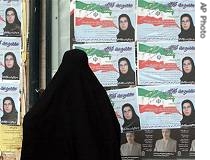2006年VOA标准英语-Analysts: Iran Elections to Gauge President's P(在线收听)
By Gary Thomas
Washington
14 December 2006
Iranians are to vote Friday in elections for local governments, as well as the body that will choose the country's Supreme Leader. As VOA correspondent Gary Thomas reports, the elections are expected to open up simmering rivalries on Iran's political landscape.

Iranian woman, wearing the traditional Islamic black veil, looks at campaign posters of female candidate Masoumeh Kolahi, in Tehran, 13 Dec 2006
Friday's elections have significance as a both a barometer of President Mahmoud Ahmadinejad's popularity and power and as an indicator of Iran's future course.
Voters are to choose city and rural councils that have considerable political clout, including the power to appoint a mayor. Ahmadinejad was mayor of Tehran until his surprising electoral victory 18 months ago.
Also at stake is the Assembly of Experts, a board of Islamic clerics whose main function is to monitor the performance of Iran's Supreme Leader and, if necessary, appoint a new one - a task it has performed only once, when it named Ayatollah Ali Khamenei to the post in 1989.
One hundred, sixty-three candidates have been approved by the Guardian Council to run for seats on the 86-member body. Ayatollah Mohammad Taqhi Mesbah-Yazdi is heading a slate of conservative Ahmadinejad supporters. Opposing them is a group backed by an old guard politician, former President Ali Akbar Hashemi Rafsanjani, who lost to Ahmadinejad in last year's presidential vote.
Ken Katzman, an Iran analyst at the nonpartisan Congressional Research Service, calls the Assembly of Experts election "enormously important."
"That could really determine the future of the direction of the regime because Mesbah-Yazdi is a hardliner close to Ahmadinejad who, should they win that election, be really in a position to support Ahmadinejad against his rivals within the regime and, to some extent, counterbalance the power of the Supreme Leader," he explained.
The reform movement, which has been badly battered in recent years, hopes to make a comeback, especially in the critical Tehran City Council races. The outcome in local polls, say analysts, may hinge on how well people think President Ahmadinejad has performed in his first 18 months in office.
Ahmadinejad campaigned last year as a populist, pledging to redistribute wealth. As a non-cleric, he also stands in stark contrast to his rival Rafsanjani, a cleric widely perceived as having enriched himself through the various offices he has held in the Iranian government.
Wayne White, a former senior State Department intelligence analyst now at the Middle East Institute, says Ahmadinejad's track record on keeping his campaign promises is mixed.
"He has come under some criticism already for not living up to his promises of delivery, in other words, still promising and not bringing home the goods for a lot of people," noted White. "So I would say that for Ahmadinejad probably the next year is going to be very important because people are not going to wait forever to see substantial rewards."
But, White adds, Ahmadinejad's support still seems to be strong among the poorer classes in Iran, at least for now.
"Things are in flux. But Ahmadinejad may be a more significant player than some people give him credit for. I think he's very clever politically," commented White. "He probably does not have great foresight or experience in international affairs. And he may actually be able to muster considerable street power, particularly in Tehran among poor Tehranis, which is, let's face it, the center of politics and political action in Iran."
Analysts say the success of Ahmadinejad supporters in the local elections will also hinge on how well his core support of post-Revolution young conservatives get out the vote. Text messaging on mobile phones, which did not exist at the time of the 1979 Iranian revolution, is now a favorite political and social organizing tool in Iran.